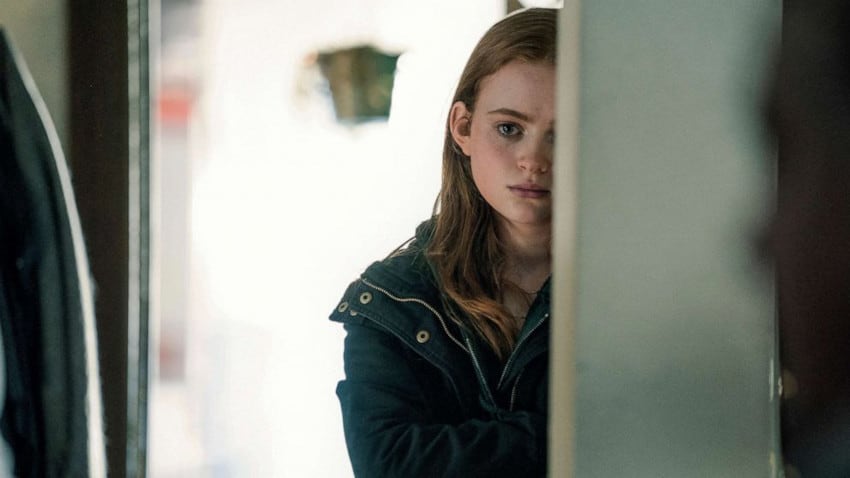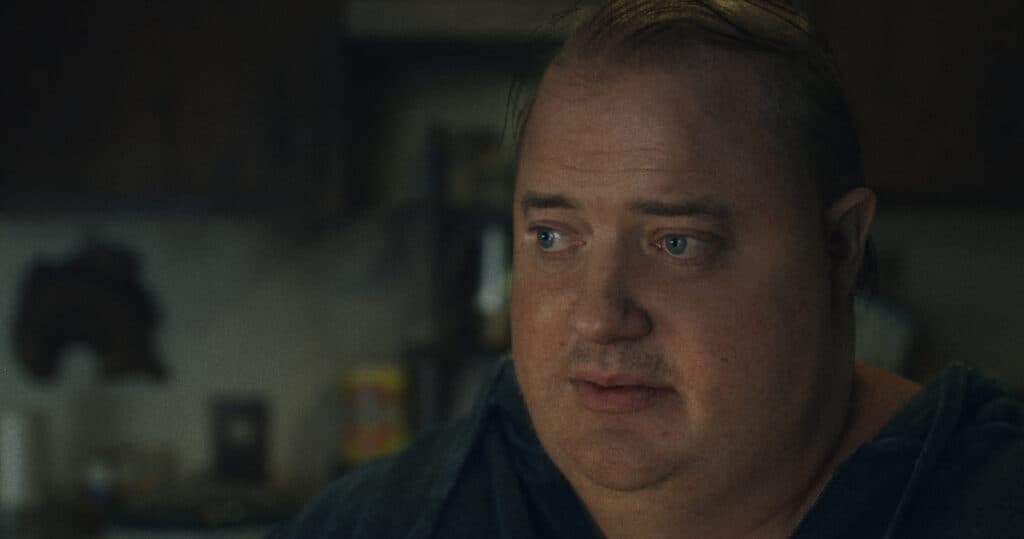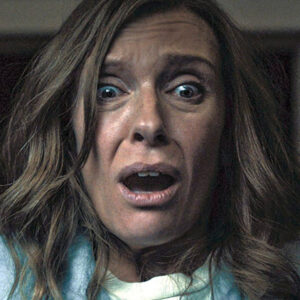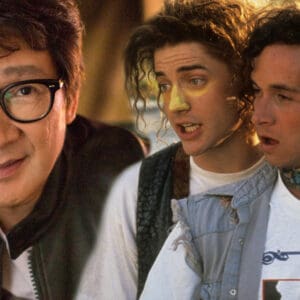Last Updated on December 13, 2022
Darren Aronofsky is a fascinating filmmaker. From his impressive feature film directorial debut, Pi, to his many intriguing creations, including Requiem for a Dream, The Wrestler, Black Swan, and Mother!. His latest, The Whale, is a profound and moving story, one that hasn’t left me thoughts since my first viewing a few weeks back. The film stars Brendan Fraser in one of the year’s best performances. It also features an exceptional group of talent, Sadie Sink, Ty Simpkins, Hong Chau, and Samantha Morton. We recently sat down with Fraser and the crew to talk about the film, and it was a wonderful experience.
This past week we added another interview to our schedule, and that was the man behind the film. Chatting with Darren Aronofsky was a marvelous experience. During our talk, we discussed what it was about the play by Samuel Hunter that struck him. As well, we discussed the brilliant casting of Fraser and Sink. And ultimately, the conversation went into some controversies about the casting and the story itself. The film moved me deeply, especially having a slight personal connection and a struggle with obesity. The Whale is stunning. It’s an unforgettable film with a flawless leading performance from Mr. Fraser. While this may not connect with all, it drew me in effortlessly.
Darren, I love your work. I’m just going to be really honest with you. I like that you take on subjects and stories that many filmmakers are afraid to take on.
Darren Aronofsky: It’s not conscious. It’s just I take on the things that I want to take, so it’s just, I don’t know. It’s my own… Anyway. It is what it is.
Yeah. Well, so The Whale, you wanted to make this film about a decade ago, correct?
DA: Well, I got the rights ten years ago. I saw the play almost ten years ago to the day. It was playing at Playwrights Horizon, this really cool, off-Broadway company in New York City on 42nd Street. And I was just so moved by the play. I think the next day, I reached out to Sam Hunter to discuss the possibility of getting the rights.
Wow. What were the themes? I mean, you can look at it from straight on. You go, “Oh yeah, it’s about a man affected by obesity.” But there’s way more here than that.
DA: Right? It’s so much, that’s what’s so beautiful about Sam’s writing is that it’s got incredible layers and metaphors and density and connections and humor and sadness and pathos. There’s just so much going on that I’m still getting stuff out of the material. And when you watch a film as a director, you see it, I mean, hundreds if not 1000 times. So many times I’ll watch a scene over and over and over again, and I’ll still see new things in the material that I was like, “Oh wow. I didn’t see the connection there.”
So I was really lucky and blessed that he gave me the rights to amplify his voice. And the themes, as you ask, there’s just so many. I mean, what I love is that it has so many different types of emotion, from humor and hope to sadness to regret. Anyway, it was a lot to sink my teeth in. And when I first started making the material, I was still learning it. And the actors themselves, they taught it to me because they would read something in a certain way that I’d be like, “Oh, I never saw that.” So it was fun to have material that allowed me to constantly be learning.
Well, you are adapting a play. Oftentimes the problem with that is it either looks too much like a play, or they stray too far from what the source material is talking about. This is a really interesting, and dare I say, beautiful balance of recreating a staged show without giving up that this was a play, that this did come from a play. How do you do that and make it work and find that balance of making it look interesting and keeping it visually a unique film?
DA: Well look, I think in cinema, there’s one place to put the camera in every scene, and it’s the job of the director to figure that out. A lot of movies don’t sort of demonstrate that, but I had a mentor named Stuart Rosenberg, a great director who taught me to always search for that. But where you put the camera can help the performance and can help the text have more meaning. I mean, the obvious one is a horror film. You shoot Frankenstein from below, and then if you want to be God-like you shoot from above, looking down on your characters.
But there’s so much more to it. It’s all about blocking and the movement of camera to create a relationship between the characters to each other. And then, hopefully, that thematically supports what the whole thing’s about. A good demonstration in The Whale would be the scene when Sadie Sink first comes to the apartment. She’s stalking and playing with her dad like a cat would play with a ball of yarn. And so she is behind him, walking behind him, knowing that his movement is so limited and he’s struggling to look over his shoulder to see his daughter that he loves. And it sort of sets up her cruelty and his awkwardness and inability to move.
So using the camera and blocking to really bring to life the text is what you can do as a filmmaker to make something more interesting and more captivating.

You mentioned Sadie, and I want to talk a little bit about that character. I mean, it’s stunning. What a marvelous role for her. How did you know she was the right person to do that?
DA: Well, it was clear to me the second I saw her in Stranger Things season two that she was a badass, amazing actress. She showed up on the screen, I was like, “Who’s that? I like her. She’s really good.” And I just gobbled up the season to see Sadie. And so she was in my mind for a while because it’s rare that a talent at that age shows up that’s unique and interesting. And so when I cast Brendan, I was like, “Oh, great. Sadie can fit.” I could see them side by side. They have similar eyes. There’s enough going on with Samantha Morton as the mom. Perfect. It all works out, I believe, the lineage and all that.
And she’s just great. She’s working at a speed so fast. She’s almost like when you put a record on at the wrong speed back in the day, and it sounds like chipmunks. She’s moving so quickly that… Like the script material, there is stuff from Sadie that I’ll see in a performance and there’s little micro decisions that are going on that are just wonderful. She’s really thinking through… Because she’s really torn between contempt and love and hope and dismay. And she’s just sitting there going back and forth. And if you watch her closely on a second or even a third or even a fourth viewing, you can see her flickering between those so quick.
Really her career is truly open-ended, and there are going to be a lot of great Sadie Sink performances yet to come. I mean, you’re looking at a young Bette Davis. There are so many things that she can be. I called it, and I’m calling it right now. I said it.
And then there is Brendan Fraser. I know you saw a performance of his from earlier and were impressed. This is a tough role; this is a hard role. How did you know he was up for it, and how did you find that?
DA: Yeah, look, it was a gut call. I hadn’t seen Gods and Monsters, I hadn’t seen School Ties, and I didn’t see a lot of George in the Jungle. I didn’t even understand how much love there was for the man in the world. I had no idea because I was from a different generation, and I missed those films. And so I didn’t grow up with him as this crazy fan. It was really… It just made sense. It clicked. And it was really a leap of faith.
He came in, and I met him, and I was like, “Wow, what a gentleman.” But the thing that was really clear to me is the guy hadn’t been given many opportunities in 20 years. And I do believe once a movie star, always a movie star, there’s that something in them that just communicates to the world. It’s like he can do something with the corner of his eye, and it translates to people around the world. That means something. I knew he had that, and it was exciting to me that none of his emotions had been seen for a long time. So it all made sense, and I had to prove it to Sam Hunter.
We set up a read-through of the script in a small theater on St. Mark’s in Manhattan. And from that moment on, when he started reading the script… I mean, I don’t know if Brendan knew it was a final callback type of thing. Sadie was there, and I was sure about Sadie. I had no doubt about Sadie. And they started to read, and I was like, “Yeah, it’s very clear that…” And it wasn’t like he was really acting. They were just reading through it. But I was like, “Okay, there’s a lot here.” I, actually, would love to go back. We videotaped it because we had no money, but still, we videotaped it. It’d be interesting to go back and see that reading.

Oh, I’d love to see that. That would be amazing. Now, you’re not new to controversy with your films, and of course, you’re getting a bit of that for this.
DA: I was so surprised. I do not understand the controversy at all.
Well, I mean, my thing is… I feel like we’re this, a time where… No matter what you do, you can make the nicest film ever. Paddington 3 will come out. “No, it’s offensive to bears.” I feel like we are at a very weirdly sensitive time. Does that hinder you in any way?
DA: It’s a bummer because the entire reason I made the film was to amplify Sam’s call of empathy for a character that is normally portrayed viciously and disgustingly in past movies. And this was the first time I saw a character living with obesity portrayed as a full human. And, of course, everyone living with obesity is a full human. But our prejudices in this world are so deep. It’s a well-known fact that the medical industry prejudges people living with obesity and doesn’t give them the same care.
After the premiere in New York a few nights ago, a group of doctors came over to me, and they were like, “Thank you.” Because now, when they see someone come in dealing with similar issues, they know Charlie. And they know that there’s a real person there. And that’s what excited me when I saw the play ten years ago. I was like, “How am I ever going to relate to any of these characters? Charlie or any of them?” But because of Sam’s writing, I was just so taken, just so moved by it. And all of the Obesity Action Coalition, which was an advisor on this the whole way, just getting letters from them of what the film means to be finally represented.
I just wish people would just take a breath and actually watch the film. The other thing that’s been interesting is how much people react against the earnestness of Sam’s message. That cynicism is so deep in our culture, and it’s so lauded as the way to be that film that preaches love and forgiveness in an honest way… It’s just sad that people don’t greet Sam’s sweetness in a respectful way.
Well, I think we’re so afraid of our own faults that we… But we’re constantly judging other people for their mistakes, or they’re… And I feel like this film does an intensely good job at creating characters that are flawed. I know these characters.
We have to finish up, but, I really do want to tell you really quickly, I first met you at The Fountain press day in 2006 at a roundtable interview. I was 350 (give or take) pounds at one point.
DA: Oh, are you? Wow.
I was, and now I’m 173.
DA: Boom. (Virtual fist bump)
So this movie was devastating. It broke my heart in many ways, but I think it’s one of the best films of the year. And I praise you for it.
DA: So you think we did a good job in sort of portraying that? Whatever struggles you were going through and stuff?
Everything is right on.
DA: Thank you, bro.
See, that’s what I mean. I need more people like you to say, “Hey, shut the hell off these…” I mean, if you think about it, people with obesity and films have always been punchlines, jokes, or evil characters. And also, the makeup has always been a joke. I mean, it’s disgusting in how it’s portrayed, but it’s just interesting to see, as soon as you put realism into it, people are like, “Whoa, why are you making me look at this?” And it’s like, “Because we’re people.” Not everyone’s built like…
I feel like you make people look at reality, and I think that’s a beautiful thing sometimes.
DA: Thank you bro. See you down the road.
Thank you, buddy.
I’d like to sincerely thank Mr. Aronofsky for this excellent conversation. Please check out The Whale, in theatres, it’s a powerhouse of a movie.




















Follow the JOBLO MOVIE NETWORK
Follow us on YOUTUBE
Follow ARROW IN THE HEAD
Follow AITH on YOUTUBE